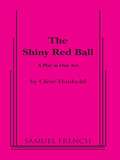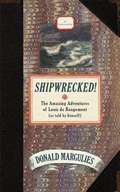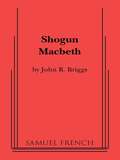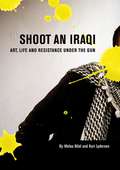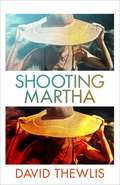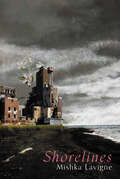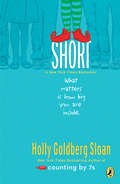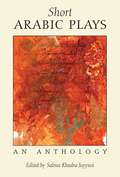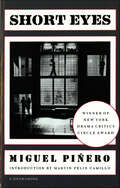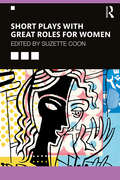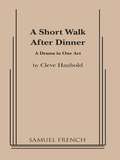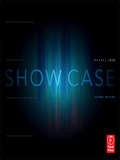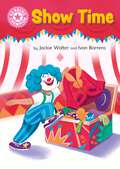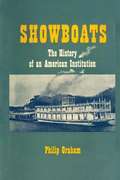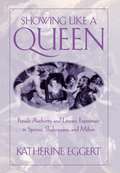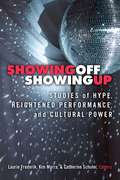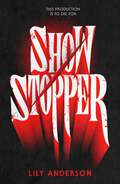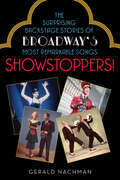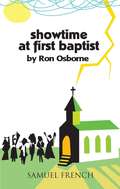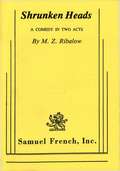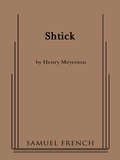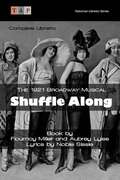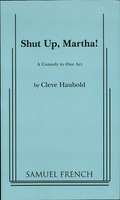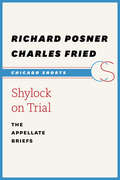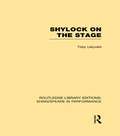- Table View
- List View
Shiny Red Ball
by Cleve HauboldComedy / 2 m. / Interior / Charlie and Johnny wander in to do a day's work. At a signal, they don their buyer and seller suits to play out a hilarious game of trading for a shiny red ball. Each tries every trick he can devise to outwit the other-- alternately friendly, angry, subtle, doubtful, savage and indifferent. When the sale is made, they rest for a moment and then trade places to begin again.
Shipwrecked!
by Donald Margulies"A deft literate narrative folded into a vaudevillian romp."--Los Angeles TimesDonald Margulies aims to invigorate the imagination of theatergoers with a story about the nature of storytelling. Based on a Victorian hoaxer's tale of being a castaway in the South Pacific--complete with buried treasure, a giant killer octopus, and cannibals--Margulies revisits themes of authenticity and loss as he returns to what theater does best.Donald Margulies received the 2000 Pulitzer Prize for Drama for Dinner with Friends, which has been produced throughout the world. Other plays include Sight Unseen (winner of an OBIE Award), Brooklyn Boy, and Collected Stories, among many others.
Shogun Macbeth
by John R. BriggsDrama \ 12 m., 6 f. \ Unit set. \ This brilliant adaptation of Shakespeare's classic tragedy was produced by Pan Asian Rep in New York to great acclaim. In 13th century Japan, General Macbeth is victorious in battle and awarded the title of Ryoshu of Akita. Almost immediately he is visited by the legendary witches called the Three Yojos. In the thrall of their spell, he is consumed by ruthless ambition. He instigates a plot to become the new Shogun and, with the help and incitement of his wife, begins to slaughter his way to the royal crown and ultimately to meet his doom. \ "Shogun Macbeth is a Kurosawa film on stage." N.Y. Times.
Shoot an Iraqi
by Kari Lydersen Wafaa BilalWafaa Bilal's childhood in Iraq was defined by the horrific rule of Saddam Hussein, two wars, a bloody uprising, and time spent interned in chaotic refugee camps in Kuwait and Saudi Arabia. Bilal eventually made it to the United States to become a professor and a successful artist, but when his brother was killed at a checkpoint in Iraq in 2005, he decided to use his art to confront those in the comfort zone with the realities of life in a conflict zone.Thus the creation and staging of "Domestic Tension," an unsettling interactive performance piece: for one month, Bilal lived alone in a prison cell-sized room in the line of fire of a remote-controlled paintball gun and a camera that connected him to Internet viewers around the world. Visitors to the gallery and a virtual audience that grew by the thousands could shoot at him twenty-four hours a day. The project received overwhelming worldwide attention, garnering the praise of the Chicago Tribune, which called it "one of the sharpest works of political art to be seen in a long time," and Newsweek's assessment "breath taking." It spawned provocative online debates, and ultimately, Bilal was awarded the Chicago Tribune's Artist of the Year Award.Structured in two parallel narratives, the story of Bilal's life journey and his "Domestic Tension" experience, this first-person account is supplemented with comments on the history and current political situation in Iraq and the context of "Domestic Tension" within the art world, including interviews with art scholars such as Dean of the School of Art at Columbia University, Carol Becker, who also contributes the introduction. Shoot an Iraqi is equally pertinent reading for those who seek insight into the current conflict in Iraq and for those fascinated by interactive art technologies and the ever-expanding world of online gaming.
Shooting Martha
by David Thewlis'A riotously good novel, witty and earnest, brimming with sharply drawn characters and creeping suspense. David Thewlis is a fabulous writer' Anna Bailey, Sunday Times bestselling author of Tall BonesCelebrated director Jack Drake can't get through his latest film (his most personal yet) without his wife Martha's support. The only problem is, she's dead...When Jack sees Betty Dean - actress, mother, trainwreck - playing the part of a crazed nun on stage in an indie production of The Devils, he is struck dumb by her resemblance to Martha. Desperate to find a way to complete his masterpiece, he hires her to go and stay in his house in France and resuscitate Martha in the role of 'loving spouse'.But as Betty spends her days roaming the large, sunlit rooms of Jack's mansion - filled to the brim with odd treasures and the occasional crucifix - and her evenings playing the part of Martha over scripted video calls with Jack, she finds her method acting taking her to increasingly dark places. And as Martha comes back to life, she carries with her the truth about her suicide - and the secret she guarded until the end.A darkly funny novel set between a London film set and a villa in the south of France.A mix of Vertigo and Jonathan Coe, written by a master storyteller.PRAISE FOR DAVID THEWLIS'S FICTION 'David Thewlis has written an extraordinarily good novel, which is not only brilliant in its own right, but stands proudly beside his work as an actor, no mean boast' Billy Connolly'Hilarious and horror-filled' Francesca Segal, Observer'A fine study in character disintegration... Very funny' David Baddiel, The Times'Exquisitely written with a warm heart and a wry wit... Stunning' Elle'Queasily entertaining' Financial Times'A sharp ear for dialogue and a scabrously satiric prose style' Daily Mail'Laugh-out-loud, darkly intelligent' Publishers Weekly'This is far more than an actor's vanity project: Thewlis has talent' Kirkus
Shorelines
by Mishka LavigneA small military-occupied community sits, waiting, parched of natural water while nearby levees hold the rising global shoreline. Seventeen-year-old twins Alix and Evan pass the time in an empty, abandoned pool with what they are able to scavenge from the abandoned houses, while government official Portia returns to familiar places, her past colliding with the present. The planned evacuation notice that eventually reaches all cities has finally come, but the twins learn that survival is not guaranteed. As they rush to reach their grandmother, a retired journalist now living with dementia, her snippets of memories flow like humanity’s record player, skipping tracks before the final flood.A non-linear poetic play that acts like a postcard from the future, Shorelines is about family and community in a world ravaged by climate change. It also speaks to the inevitable inequality of disaster response and how poorer communities are disproportionately affected by it. Mishka Lavigne’s message within her lyrical piece is urgent and multi-dimensional: it is a reminder that all things are connected and hope can only lie in the relationships we form with the people around us.
Short
by Holly Goldberg Sloan<P>Julia is very short for her age, but by the end of the summer run of The Wizard of Oz, she’ll realize how big she is inside, where it counts. <P>She hasn’t ever thought of herself as a performer, but when the wonderful director of Oz casts her as a Munchkin, she begins to see herself in a new way. <P>As Julia becomes friendly with the poised and wise Olive—one of the adults with dwarfism who’ve joined the production’s motley crew of Munchkins—and with her deeply artistic neighbor, Mrs. Chang, Julia’s own sense of self as an artist grows. <P>Soon, she doesn’t want to fade into the background—and it’s a good thing, because her director has more big plans for Julia! <P>Bubbling over with humor and tenderness, this is an irresistible story of self-discovery and of the role models who forever change us. <P><b>A New York Times Bestseller</b>
Short Arabic Plays: An Anthology
by Salma Khadra JayyusiIt is only in fairly recent times that Arab writers have turned their hands to the theater. This collection of nineteen short plays is evidence of the remarkable strides made as numerous playwrights have come to grips with the problems and potential involved with this genre. The essence of the collection is its sheer variety. The subject matter ranges from the horrors of a political prison camp to the comic tribulations of furtive lovers trapped in a minefield, from historical fable to the world of official bureaucracy, while dramatic treatments range from the conventional to the highly experimental, some using surreal techniques—now disturbing, now hilariously amusing. Many of the plays use humor or pungent satire to address distinctively Arab issues and problems, whether these have their source outside or inside the Arab world itself. The collection gives a valuable insight into a fast-changing and increasingly distinctive area of modern Arabic literature. Featured authors and plays: Yusuf al-'Ani -- Where the Power Lies Fateh Azzam and others -- Ansar Samia Qazmouz Bakri -- The Alley Mahmoud Diyab -- Men Have Heads Ahmad Ibrahim al-Fagih -- The Singing of the Stars Alfred Farag -- The Person Tawfiq al-Hakim -- Boss Kanduz&’s Apartment Building Tawfiq al-Hakim -- War and Peace Jamal Abu Hamdan -- Actress J&’s Burial Night Walid Ikhlasi -- Pleasure Club 21 Riad Ismat -- Was Dinner Good, Dear Sister? Raymond Jbarra -- The Traveler Sultan Ben Muhammad al-Qasimi -- The Return of Hulegu 'Ali Salim -- The Coffee Bar Mamduh Udwan -- The Mask Mamduh Udwan -- Reflections of a Garbage Collector Sa'd al-Din Wahba -- The Height of Wisdom Sa'dallah Wannus -- The Glass Café Sa'dallah Wannus -- The King's Elephant
Short Eyes: A Dramabook (Mermaid Dramabook)
by Miguel PiñeroWinner of the New York Drama Critics Circle AwardThis powerful drama of prison life is set in a house of detention where a group of young convicts-predominantly black and Puerto Rican-taunt, fight, insult, and entertain one another in an attempt to preserve their sanity and to create a semblance of community. When a young white prisoner accused of child molesting is thrown into the cell block by a guard who says he belongs in Sing Sing because "the men up there know what to do with degenerates like you," the stage is set for an explosive series of events; for, among prisoners, this child molester called "short eyes" is the lowest of criminals.
Short Plays with Great Roles for Women
by Suzette CoonShort Plays with Great Roles for Women is an antidote to the traditional underrepresentation of women on stage, by offering twenty-two short plays that put women right at the centre of the action. The push for more women’s roles has gathered force over the last few years, and this collection is part of that movement, with rich, intelligent roles for women of all ages and backgrounds. This anthology offers a vital slice of life, addressing relevant and diverse topics such as: a young, Islamic woman coming out to her religious mother; black women’s navigation of the natural hair movement; bullying in a small-town American school; social media addiction; and the trials and tribulations of family life. Plays from award-winning playwrights are supported by original production details and playwrights’ afterwords, forming a broad and comprehensive collection of complete texts that offer full character journeys. Appealing to aspiring performers, playwrights, directors and students, Short Plays with Great Roles for Women is an essential resource for actor training, assessments, showcases, show-reels, short films and theatre performances.
Short Walk After Dinner
by Cleve HauboldCharles Haven returns home from a short walk after dinner to find something has gone hauntingly, terrifyingly wrong with his life. With growing alarm he tries to explain away the strange change that has come over him, finally discovering he has unaccountably lost twenty years during his walk.
Show Case: A Guide to Developing, Maintaining, and Presenting a Design-Tech Portfolio for Theatre and Allied Fields
by Rafael JaenYour theatrical portfolio will earn a standing ovation with guidance from this industry expert!
Show Time: Independent Pink 1b (Reading Champion #610)
by Jackie WalterThis story is part of Reading Champion, a series carefully linked to book bands to encourage independent reading skills, developed with Dr Sue Bodman and Glen Franklin of UCL Institute of Education (IOE)Reading Champion offers independent reading books for children to practise and reinforce their developing reading skills.Fantastic, original stories are accompanied by engaging artwork and a reading activity. Each book has been carefully graded so that it can be matched to a child's reading ability, encouraging reading for pleasure.
Showboats: The History of an American Institution
by Philip GrahamThis book is a delightful and authoritative record of America''s showboats from the first one, launched in 1831, to the last, ultimately tied up at a St. Louis dock. It is also a record of the men and women who built and loved these floating theaters, of those who performed on their stages, and of the thousands who sat in their auditoriums. And, lastly, it is a record of a genuine folk institution, as American as catfish, which for more than a century did much to relieve the social and cultural starvation of our vast river frontier. For these showboats brought their rich cargoes of entertainment--genuine laughter, a glimpse of other worlds, a respite from the grinding hardship of the present, emotional relaxation--to valley farmers, isolated factory workers and miners, and backwoodsmen who otherwise would have lacked all such opportunities. To the more privileged, the showboats brought pleasant reminder of a half-forgotten culture. They penetrated regions where churches and school had not gone, and where land theaters were for generations to be impossible. Like circuit preachers, they carried their message to the outer fringes of American civilization. In spite of many faults, it was a good message. The frontier had created this institution to fill a genuine need, and it lasted only until other and better means of civilizing these regions could reach them--good roads, automobiles, motion pictures, schools, churches, newspapers, and theaters. But although the showboats have passed into history, they have left a rich legacy. As long as the Mississippi flows into the Gulf, their story will fire the imagination of Americans. Showboating has become so legendary that few Americans know what this unique institution was really like. In Showboats, at long last, the true story emerges. It differs in many important respects from the motion picture and fictional versions to which Americans are accustomed, but it is not a whit the less glamorous. Philip Graham has told his story with imagination, genuine insight, and complete devotion to facts. No one who is interested in America''s past should fail to read it. This book is a delightful and authoritative record of America''s showboats from the first one, launched in 1831, to the last, ultimately tied up at a St. Louis dock. It is also a record of the men and women who built and loved these floating theaters, of those who performed on their stages, and of the thousands who sat in their auditoriums. And, lastly, it is a record of a genuine folk institution, as American as catfish, which for more than a century did much to relieve the social and cultural starvation of our vast river frontier. For these showboats brought their rich cargoes of entertainment - genuine laughter, a glimpse of other worlds, a respite from the grinding hardship of the present, emotional relaxation - to valley farmers, isolated factory workers and miners, and backwoodsmen who otherwise would have lacked all such opportunities. To the more privileged, the showboats brought pleasant reminder of a half-forgotten culture. They penetrated regions where churches and school had not gone, and where land theaters were for generations to be impossible. Like circuit preachers, they carried their message to the outer fringes of American civilization. In spite of many faults, it was a good message. The frontier had created this institution to fill a genuine need, and it lasted only until other and better means of civilizing these regions could reach them - good roads, automobiles, motion pictures, schools, churches, newspapers, and theaters. But although the showboats have passed into history, they have left a rich legacy. As long as the Mississippi flows into the Gulf, their story will fire the imagination of Americans. Showboating has become so legendary that few Americans know what this unique institution was really like. In Showboats, at long last, the true story emerges. It differs in many important respects from the motion picture and fictional versions to which Americans are accustome...
Showing Like a Queen: Female Authority and Literary Experiment in Spenser, Shakespeare, and Milton
by Katherine EggertFor most Renaissance English thinkers, queenship was a catastrophe, a political accident that threatened to emasculate an entire nation. But some English poets and playwrights proved more inventive in their responses to female authority. In Showing Like a Queen, Katherine Eggert argues that Spenser, Shakespeare, and Milton turned the political problem of queenship to their advantage by using it as an occasion to experiment with new literary genres. Unlike other critics who have argued that a queen provoked only anxiety and defensiveness in her male subjects, Eggert demonstrates that even after her death Elizabeth I's forty-five-year reign enabled writers to entertain the fantasy of a counterpatriarchal realm.Eggert traces a literary history of the late sixteenth and early seventeenth centuries in which the destabilizing anomaly of female rule enables Spenser to reshape the genre of epic romance and gives Shakespeare scope to create the ruptured dynastic epic of the history plays, the psychologized tragedy of Hamlet, and the feminized tragedies of "Antony and Cleopatra" and "The Winter's Tale." Turning to the second half of the seventeenth century, Eggert reveals how even after more than sixty years of male governance, Milton bases his marital epic Paradise Lost upon the formulae of queenship.
Showing Off, Showing Up: Studies of Hype, Heightened Performance, and Cultural Power
by Catherine A. Schuler Kimberley Bell Marra Laurie FrederikThe interdisciplinary essays in Showing Off, Showing Up examine acts of showing, a particular species of performance that relies on competition and judgment, active spectatorship, embodied excess, and exposure of core values and hidden truths. Acts of showing highlight those dimensions of performance that can most manipulate spectators and consumers, often through over-the-top heightening and skewing of presentation. Many forms of showing and of heightened performance, however, operate more enigmatically and covertly while still profoundly affecting the social world, even if our reactions to them are initially flippant or unconcerned because “it’s just a show.” Examining a wide range of examples—from dog shows to competitive dancing to carnivals to striptease, the essays illuminate how such events variously foster competition, exaggerate a characteristic, and reveal hidden truths. There is as much to be learned about the power of showing through subtlety and underlying intentionality as through overt display. The book’s theoretical introduction and 12 essays by leading scholars reveal how diverse, particularly efficacious genres of showing are theoretically connected and why they merit more concerted attention, especially in the 21st century.
Showstopper
by Lily Anderson"A witty summer camp murder mystery where drama unfolds both on and off the stage . . . . In this love letter to theater life, the joy and passion derived from the art form shine through brightly." —Kirkus ReviewsTAKE YOUR FINAL BOWThe Ghostlight Youth Theater Camp isn’t the best program in the world, but to Faye, it’s home. Every summer since junior high, Faye and her friends have come together for a monthlong musical-theater intensive. For her last year before graduation, Faye’s finally ready to take center stage as her true Afro-Latina self and break out of her white-passing roles.But as Faye steps into her spotlight, complications arise. Suddenly, she’s competing with her BFF for lead roles and distracted by the attentions of the new camp hottie. Even when the drama turns deadly, Faye remains determined to make this the best production the Ghostlight has ever seen. It must be a coincidence that the stagehands keep disappearing and having gruesome accidents, right? But dark secrets are hiding behind the scenes, and opening night might turn out to be a bloodbath.
Showstoppers!: The Surprising Backstage Stories of Broadway's Most Remarkable Songs
by Gerald NachmanWhen Robert Preston shouted "Ya got trouble!" in River City, when Carol Channing glided down a gilded staircase while waiters serenaded her with "Hello, Dolly!," when Barbra Streisand defied us to rain on her parade in Funny Girl, audiences were instantly enchanted. Showstoppers! is all about Broadway musicals' most memorable numbers--why they were so effective, how they were created, and why they still resonate. Much of it is told through the eyes of the performers, songwriters, directors, and choreographers who first built these explosive numbers and lit the fuse. Gerald Nachman interviewed dozens of iconic musical theater figures, including Patti LuPone, John Raitt, Jerry Herman, Edie Adams, Dick Van Dyke, Joel Grey, Marvin Hamlisch, John Kander, Tommy Tune, Sheldon Harnick, and Harold Prince, uncovering priceless untold anecdotes and details.
Showtime at First Baptist
by Ron OsborneDramatic Comedy / 6f Showtime at First Baptist is the sequel to the hugely popular and widely produced First Baptist of Ivy Gap. First Baptist of Ivy Gap's 100th anniversary picnic was a smashing success, except for one little thing: the bolt of lightning that struck the church's steeple, igniting a fire that destroyed the sanctuary and so much more. In the wake of the disaster, key women of the church - led by Edith, the pastor's take-charge wife - gather in what's left (the fellowship hall) to commiserate and try to put things back together. To raise spirits and funds for rebuilding, the women plan an evening of entertainment designed to showcase the congregation's talent. Could it be that some of Edith's gang plan a song and dance number that may shock the congregation? If so, how will they circumvent the authority of the all-male conservative board of deacons, not to mention, one of their own? Change is in the air as these six diverse women challenge institutions as well as each other. Along the way, there are laughs to be shared, battles to be fought, love to be won, relationships to be mended, and losses to be grieved. "Good natured religious jokes aplenty and drama ... But the real meat is a gentle, warm story about six good women and how they came together despite times that are, 'a changing' ... A serious play and a delightful comedy ... I sure enjoyed it." - Bristol Herald-Courier "Sure to be an instant classic ... This touching comedy is full of laughs, realistic characters and thought-provoking issues ... The Southern women who inhabit the world of Ivy Gap are amazing! Osborne can definitely write great women characters ... It's small-town politics at its most entertaining ... Bring the whole family." - Washington County News
Shrunken Heads
by Meir Z. RibalowComedy / 3m, 4f / Interior / Dr. Bob Hyde, a successful psychiatrist, just wants to have a quiet, peaceful weekend at his country estate, where he can commune with nature and relax in his Jacuzzi, far away from his patients. No such luck. In burst an assortment of crazed or just plain eccentric characters, from his neurotic to end all neurotics patient Dorothy Putney, to his daughter Caroline who is dropping out of her seventh college to go and live in a tent in Colorado and who has stopped by for moral support and money, to Caroline's mother and Hyde's ex wife Jennifer, a master of facetious wise cracks and particularly adept at draining Dr. Bob of alimony money. When Dorothy's husband Norman, who thinks his wife is having an affair with Hyde, shows up with a gun, this wildly paced farce really hits its stride, and things build and build to an hilarious climax.
Shtick
by Henry MeyersonComedy / 1m, 2f / Unit Set / Helen's life became complicated after her husband Murray's stroke and her sister Gladys's revelation, wanting to set the record straight in case Murray should die, that she and Murray had been having an affair. Helen suspected Murray was no angel when she married him. After all, as a stand-up comic he was always on the road and she knew comics could be loose cannons. Helen knew she was trading the risk Murray would bring to any relationship, let alone marriage, for the excitement of the gamble. While Helen might have been willing to adjust to Murray and his new stroke induced limits, the stakes were raised and the game was changed by Gladys's admission of the affair. So now Helen is left on the horns of dilemma: How can she be a nurturing caretaker for a man who has deceived her (with her own sister, yet) while knowing he is a snake with no visible conscience? / "Mainstream success…spicy situation…moving effect…abundance of jokes…wittily cynical lines…Whoever like to be moved and entertained in one evening will enjoy this show." –Lidove Noviny, Prague
Shuffle Along: The 1921 Broadway Musical Complete Libretto
by Flournoy Miller Aubrey Lyles Noble SissleComplete libretto to the 1921 ground breaking musical. One of the most significant musicals of the 20th Century, “Shuffle Along” was a rarity, written, produced, and acted wholly by African Americans. For the first time racially diverse audiences celebrated the uniqueness of this musical together. While the New York Times praised Eubie Blake "swinging and infectious score," it panned the rest of the production “as extremely crude—in writing, playing and direction." That didn’t matter. New Yorkers, including George Gershwin and Fanny Brice, flocked to it and it soon became the most popular production of the season with record breaking sales. Its influences were felt throughout the 1920s when "Shuffle Along" type musicals became all the vogue.
Shut Up, Martha!
by Cleve HauboldComedy / 3m, 2f / Interior / On a stormy night, a mysterious cloaked figure appears in Benjamin Franklin's print shop to insist Ben print a letter "to save the country." The fun and confusion build until the visitor produces a basket of chocolates and casts off her disguise to reveal herself as Martha Washington. Wild eyed Martha plies the wary Ben with promises and peanut brittle to persuade him to publish her note in which she sees a Tory behind every tree. Ben tries to calm Martha, but she becomes a whirlwind of confusion, when George Washington himself angrily arrives to drag Martha back to Mount Vernon. A mad historical romp which shows how history can repeat itself.
Shylock on Trial: The Appellate Briefs
by Charles Fried Richard PosnerWilliam Shakespeare is inextricably linked with the law, his plays rich in its terms, settings, and thought processes. In Shylock on Trial: The Appellate Briefs, the Hon. Richard A. Posner and Charles Fried rule on Shakespeare's classic drama The Merchant of Venice. Framed as a decision argued by two appellate judges of the period in a trial following Shylock's sentencing by the Duke of Venice, these essays playfully walk the line between law and culture, dissecting the alleged legal inconsistencies of Shylock's trial while engaging in an artful reading of the play itself. The resultant opinions shed fresh light on the relationship between literary and legal scholarship, demonstrating how Shakespeare's thinking about legal concepts and legal practice points to a deep and sometimes vexed engagement with the law's technical workings, its underlying premises, and its social effects.
Shylock on the Stage (Routledge Library Editions: Shakespeare in Performance)
by Toby LelyveldOriginally published in 1961, this book is a study of the ways actors since the time of Shakespeare have portrayed the character of Shylock. A pioneering work in the study of performance history as well as in the portrayal of Jews in English literature. Specifically it studies Charles Macklin, Edmund Kean, Edwin Booth, Henry Irving and more recent performers.
